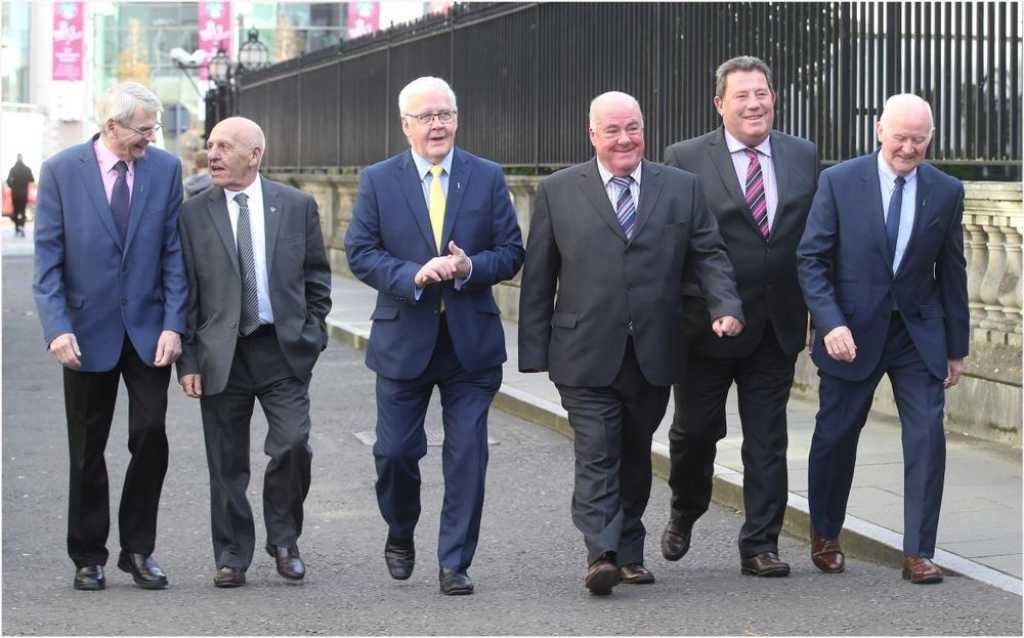Supreme Court could hear Hooded Men case
Posted By: December 20, 2017
The attached article is important information on efforts to bring the case of the Hooded Men to the Supreme Court in London. The Hooded Men were those who were tortured by the British Government in 1971. This was one of the very first cases I raised in Congress and across the country when I came to America on October 2, 1972. The British Embassy —and, disgracefully, the Irish Embassy — tried to counter my charges by claiming it was just IRA propaganda.
—Fr. Sean Mc Manus
Lawyers seek to “leapfrog” usual legal route hooded men

Legal challenge: Liam Shannon, Francis McGuigan, Jim Auld, Joe Clarke, Kevin Hannaway and Brian Turley, some of the Hooded Men, leave the High Court in Belfast after an earlier hearing
Irish News. Belfast. Wednesday, December 20, 2017
A legal challenge to the alleged torture of 14 men during internment could go directly to the UK’s highest court.
Lawyers involved in the so-called Hooded Men case want permission to “leapfrog” the usual route and bring any appeal straight to the Supreme Court in London.
The application is based on the public interest in ensuring a final outcome for surviving members of the group in proceedings related to their treatment nearly half a century ago.
In October a High Court judge ruled that a police decision to end preliminary inquiries into suspected British government-sanctioned torture of the men is to be quashed. Mr. Justice Maguire held that research to establish any criminality around their deep interrogation in 1971 had been too narrow and lacked focus.
But he rejected related claims that the state was in breach of a legal obligation to carry out a full and independent investigation into their treatment – because the events occurred decades before human rights legislation came into force.
The verdict left the PSNI facing a fresh process on how to handle allegations of ministerial involvement which emerged in a 2014 television documentary.
Lawyers in the case returned to court this week seeking a certificate that would allow any challenge to the outcome to bypass the Court of Appeal.
Although no appeal has been confirmed, Mr. Justice Maguire was told the application to take a leapfrog appeal to the Supreme Court was agreed by the parties.
Hugh Southey QC, representing most of the surviving Hooded Men, said: “If ever there was a case where a certificate is appropriate this is that case.”
Judgment was reserved.
Outside court, the men’s solicitor, Darragh Mackin of KRW Law, stressed the need to secure a final resolution.
He said: “Given the significant and importance of the issues in play, it is our view that this matter should proceed directly to the Supreme Court.
“One of our clients has sadly passed away since this case began. Time is of the
essence.”
The Hooded Men issued proceedings against the chief constable, the secretary of state and the Department of Justice.
During the original case, they argued the authorities have failed to comply with duties under the European Convention on Human Rights to properly probe and order a full inquiry into what happened to them while interned at British army facilities in Ballykelly, Co. Derry.
Five techniques were used against the men while they were held without trial: being hooded, made to stand spread-eagled in a stress position against a wall and beaten if they fell; forced to listen to constant loud static noise; and deprived of sleep, food and water.
RUC Special Branch officers were said to have been taught the methods by soldiers but sought assurances of immunity from prosecution before carrying them out.
In a statement one of the group recalled collapsing and being punched in the stomach to revive him.
He said he was against the wall for three days, subjected to kicks or beatings every time he dropped to the ground or fell asleep.
The court was told he suffered hallucinations and prayed for death.
It was claimed that the group’s treatment during the British government’s internment program in Northern Ireland was on the scale of a war crime.
Counsel for the government and the chief constable countered that the 1998 Human Rights Act, which came into force in 2000, has no retrospective powers.










